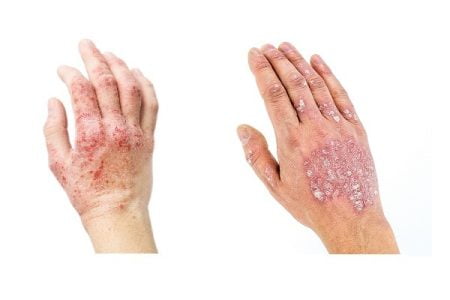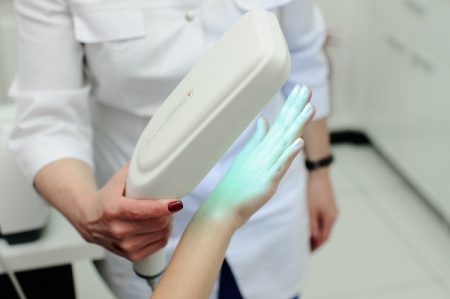Complications of Psoriasis
- Updated on: Jul 10, 2024
- 3 min Read
By
- Published on Sep 26, 2019


Psoriasis is a long-term inflammatory disease that affects the skin of the patient. It is characterized by red, itchy silvery scales over the body. Skin plays a very important role in a person’s life. Skin is responsible for regulating body temperature, protecting against infections and providing hydration.
What are the complications of psoriasis?
When diseases like psoriasis affects the body, it is evident that the body will undergo a lot of changes. And such changes may invite additional problems. Having psoriasis could put a person at a high risk of developing certain diseases. They are as follows.
Bacterial or fungal infections of the skin
The itchy, inflamed nature of psoriasis can lead to increased scratching of the affected areas. This may introduce bacterial or fungal infections. In serious cases, this may even lead to open sores and lesions.
Psoriatic arthritis
Psoriatic arthritis can cause joint damage and a loss of function in some joints. Having psoriasis increases the risk of developing psoriatic arthritis.
Eye conditions
There are certain eye disorders like conjunctivitis (commonly known as pink eye), blepharitis (inflammation of the eyelid) and uveitis (an inflammatory eye disease) that are more common in people with psoriasis. It is estimated that about 7 percent of the people suffering from psoriatic arthritis also develop uveitis eventually.
Hearing problems
Hearing problems may be seen in people with psoriatic arthritis. Researchers have found that more than 31 percent of psoriasis-affected individuals experienced hearing loss.
Obesity
The more severe the disease, the more likely a patient is to be obese. However, their association is not yet clear, possibly some research suggests that psoriasis could lead to obesity (because psoriasis affected people are less active), while other studies have shown that obese people are more likely to be at a risk of developing certain forms of psoriasis. Losing and maintaining weight may help improve the condition of the patient.
Type 2 diabetes
People with severe psoriasis are 30 percent more likely to have type 2 diabetes. If a psoriatic person experiences any of the symptoms of diabetes like hunger, increased thirst, blurred vision, or fatigue, he/she should immediately contact the doctor.
High blood pressure
The chances of having high blood pressure are relatively higher for people with psoriasis and psoriatic arthritis. If blood pressure is not in control, it can lead to various other problems like heart failure, stroke or kidney failure.
Cancer
There is a higher risk of developing cancers such as nonmelanoma skin cancer if psoriasis or psoriatic arthritis is already diagnosed. Thus, regular cancer screenings are important for such person.
Read about diagnosis of psoriasis.
Cardiovascular disease
Severe psoriasis can lead to a risk of developing cardiovascular disease. The risk is twice as high as it is for those without the disease. Psoriasis and certain treatments options of psoriasis also increase the chances of experiencing irregular heartbeat, stroke, and high cholesterol.
Metabolic syndrome
Metabolic syndrome is a collection of conditions including high blood pressure, elevated insulin levels, and abnormal cholesterol levels, which eventually increases the risk of heart disease such as coronary artery disease. People with psoriasis are more prone to develop this syndrome.
Crohn’s disease
It is an auto-immune, chronic inflammatory condition of the gastrointestinal tract. It is said that 10 percent of women suffering from psoriasis develop the Crohn’s disease. And people having both psoriasis and psoriatic arthritis are even at a greater risk of developing this disease.
Parkinson’s disease
This is a chronic neurological condition that affects the motor skills of the person. And it is more likely to affect people with psoriasis.
Kidney disease
People with severe psoriasis are twice as likely to develop chronic kidney disease as those who had mild psoriasis or no psoriasis.
Liver problems
The nonalcoholic fatty liver disease is seen in people with psoriasis and psoriatic arthritis. The nonalcoholic fatty liver disease is a condition in which too much fat is stored in liver cells.
Osteoporosis
It is an early form of the bone disease. Nearly 60 percent of people with psoriasis are facing the problem of osteoporosis.
Emotional problems
Psoriasis can also affect your quality of life. Psoriasis is associated with low self-esteem and depression.
You withdraw yourself socially. Studies have shown that having psoriatic arthritis may put the patient at a greater risk of low self-esteem, low confidence and eventually depression. But treating the psoriasis symptoms may help improve these weaknesses.












